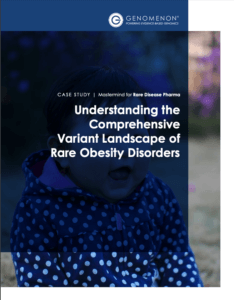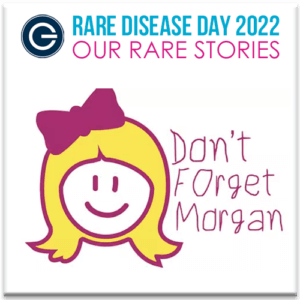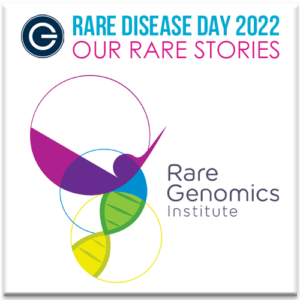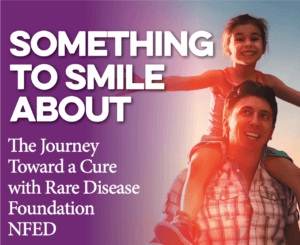In honor of Rare Disease Day February 28, 2022, we are excited to present Genomenon’s “Our Rare Stories” Live Blog, where we will be compiling articles, informative webinars, press releases, and other compelling resources that all play a part in highlighting the inspiration for our mission—patient stories.
Monday, FEBRUARY 28, 2022
“Our Rare Stories” has featured a diverse and information-packed collection of narratives from patients, caregivers, researchers, parents, and advocates. You have also had a chance to see how genomic intelligence and the power of continued innovation within rare disease has left an indelible mark, not only on the way we treat these diseases, but also the way we perceive their outcomes. With more science comes more hope for the future—and for Genomenon, one of the most powerful examples of this has been our work with Rady Children’s Hospital.
Today’s Rare Disease Day resources include the heartwarming video story of Fitz, a baby born with a rare immune deficiency, and the herculean efforts of his genomics care team at Rady. You’ll also find a GenomeWeb webinar where Dr. Stephen Kingsmore, President and CEO of Rady Children’s Institute for Genomic Medicine, provides an overview of their literature curation process that is powered by the Mastermind Genomic Search Engine. Finally, you’ll read an amazing story of how, in the face of a daunting diagnostic odyssey, Mastermind succeeded over other research tools—and saved a newborn baby’s life.
![]()

![]()
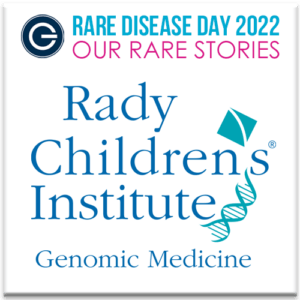 Featured Mastermind Story | Fitz’s Story
Featured Mastermind Story | Fitz’s Story
Rady Children’s Institute for Genomic Medicine
Rady Children’s Institute for Genomic Medicine is a non-profit research organization embedded within Rady Children’s Hospital in San Diego. After pioneering a medical revolution to end the diagnostic odyssey for neonatal and pediatric rare disease, RCIGM now has their sights set on ending the therapeutic odyssey. One of these patients was Fitz.
Fitz’s newborn screening revealed a severe immune deficiency requiring urgent medical attention. Upon arriving at Rady, whole genome sequencing and the use of the Mastermind Genomic Search Engine revealed a mutation in his genetic code within 92 hours – leading to a confirmed diagnosis of ARTEMIS-deficient severe combined immunodeficiency (SCID). Fortunately for the Kettler’s, this diagnosis shifted the outlook for Fitz’s future from uncertainty to hope. Watch Fitz’s story below:
![]()
![]()
In honor of #RareDiseaseDay… Meet Baby Fitz. https://t.co/8rnZpBaCzs pic.twitter.com/p6v4dIlDZQ
— Rady Genomics (@RadyGenomics) February 28, 2022
![]()
![]()
![]()
GENOMICS WEBINAR | Rapid Whole Genome Sequencing
How Rady Children’s Institute Is Increasing Diagnostic Yield and Improving Outcomes
In this GenomeWeb webinar, Dr. Stephen Kingsmore, President and CEO of Rady Children’s Institute for Genomic Medicine, gives an executive overview of the two-time world-record-setting Rady rWGS method, followed by a deeper examination of the institute’s analysis and interpretation pipeline by Dr. Katarzyna (Kasia) Ellsworth. The presentation includes a demonstration of the Rady literature curation process that is powered by the Mastermind Genomic Search Engine.
![]()
“Using Mastermind enhances our ability to provide clinicians at the bedside with important relevant information about known treatments and interventions.” Dr. Stephen Kingsmore, President and CEO, Rady Children’s Institute for Genomic Medicine
![]()
![]()
![]()
MASTERMIND STORY | Mastermind Uncovers Baby’s Rare Immunodeficiency
![]()

![]()
The need for speed was evident when a week-old baby showed signs of an immune deficiency (SCID, or severe combined immunodeficiency). He was doing well in the neonatal ICU, but was at risk of developing severe recurrent viral bacterial and fungal infections, along with failure to thrive. But where other research tools failed, Mastermind succeeded. Find out how by reading the full Mastermind Story below.
![]()

![]()
![]()
![]()
#RAREDISEASEDAY | Follow Rady Children’s Institute for Genomic Medicine on Social Media
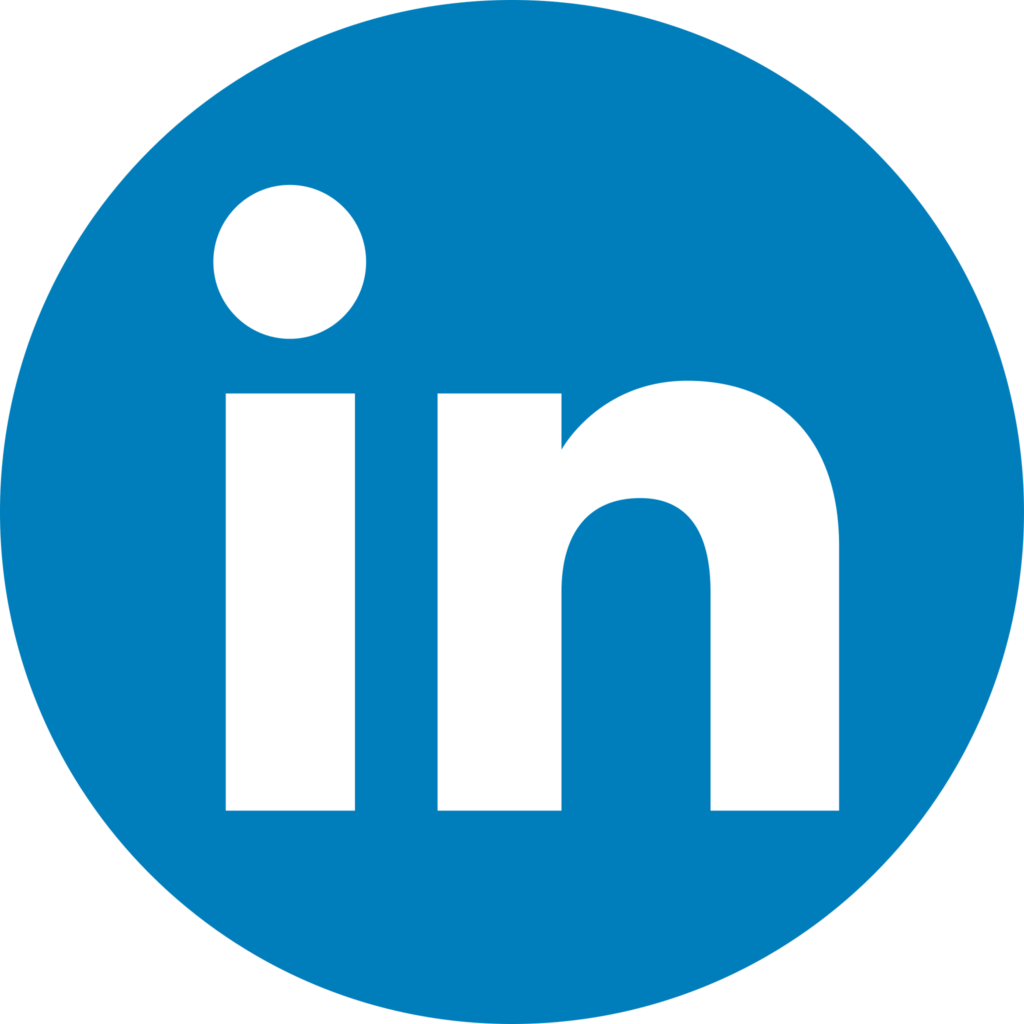 |
|
![]()

![]()
![]()
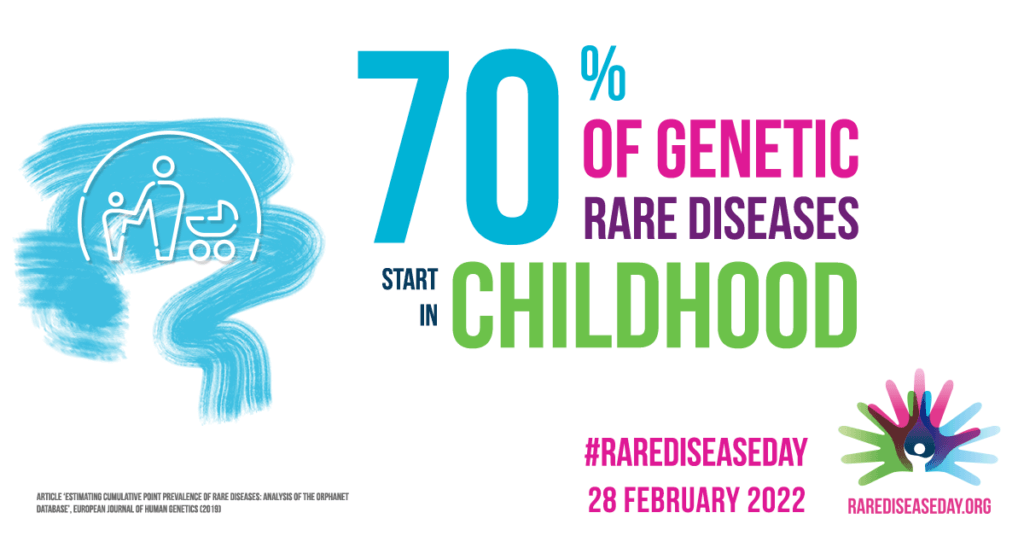
![]()
![]()
Friday, FEBRUARY 25, 2022
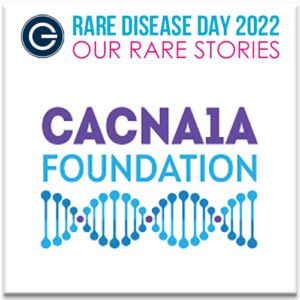 Featured Rare Disease Partner Organization
Featured Rare Disease Partner Organization
CACNA1A Foundation
CACNA1A is a gene that plays a vital role in the communication between neurons in the brain. Mutations in CACNA1A variants are associated with multiple neurological disorders, and patients exhibit a vast array of mild to severe symptoms, including neurodevelopmental differences, epilepsy, migraines, and eye disorders. Currently, there is no way to cure CACNA1A-related disorders, and treatment depends on the type of symptoms that a person has—however, a genetic diagnosis can provide access to appropriate treatments, as well as a means of connecting to other affected individuals and families.
The CACNA1A Foundation is an organization whose mission is to find specific treatment options and a cure for affected patients by building a collaborative network of patients, families, clinicians and scientists that work together to raise awareness and accelerate the understanding, diagnosis and treatment of CACNA1A-linked diseases. Partnering with Genomenon, the CACNA1A Foundation uses the Mastermind Genomic Search Engine to supplement this herculean effort with as much data-driven certainty as possible. Widely recognized by their work, the CACNA1A Foundation was recently inducted as a member of COMBINEDBrain, a non-profit consortium of 25 patient-advocacy foundations for rare genetic neurodevelopmental disorders.
![]()
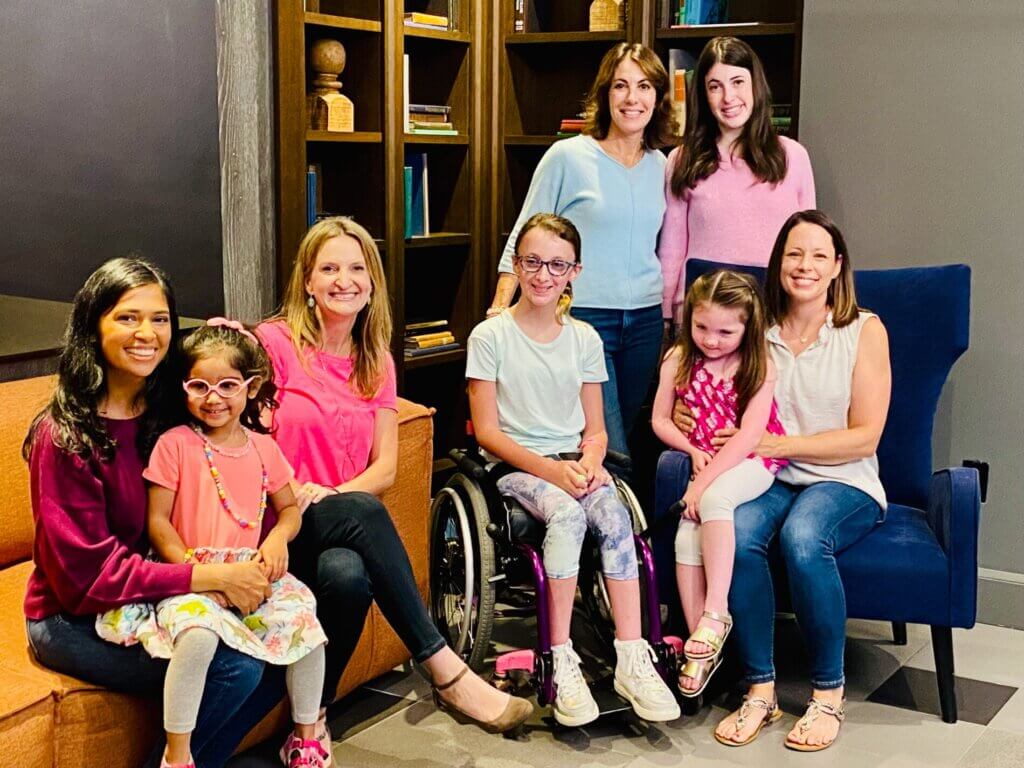
![]()
Today’s post contains a wealth of CACNA1A Foundation resources that detail their life-changing work, including an abridged documentary detailing the organization’s purpose and origin, and a Q&A with co-founder and President, Lisa Manaster.
![]()
![]()
![]()
VIDEO DOCUMENTARY | CACNA1A
Together We Can Push Science Forward
In this abridged version of the CACNA1A Foundation documentary, executive members of the CACNA1A team discuss the origins of this organization, and the founder’s inspiring quest for a cure for this rare genetic disease.
![]()
![]()
![]()
![]()
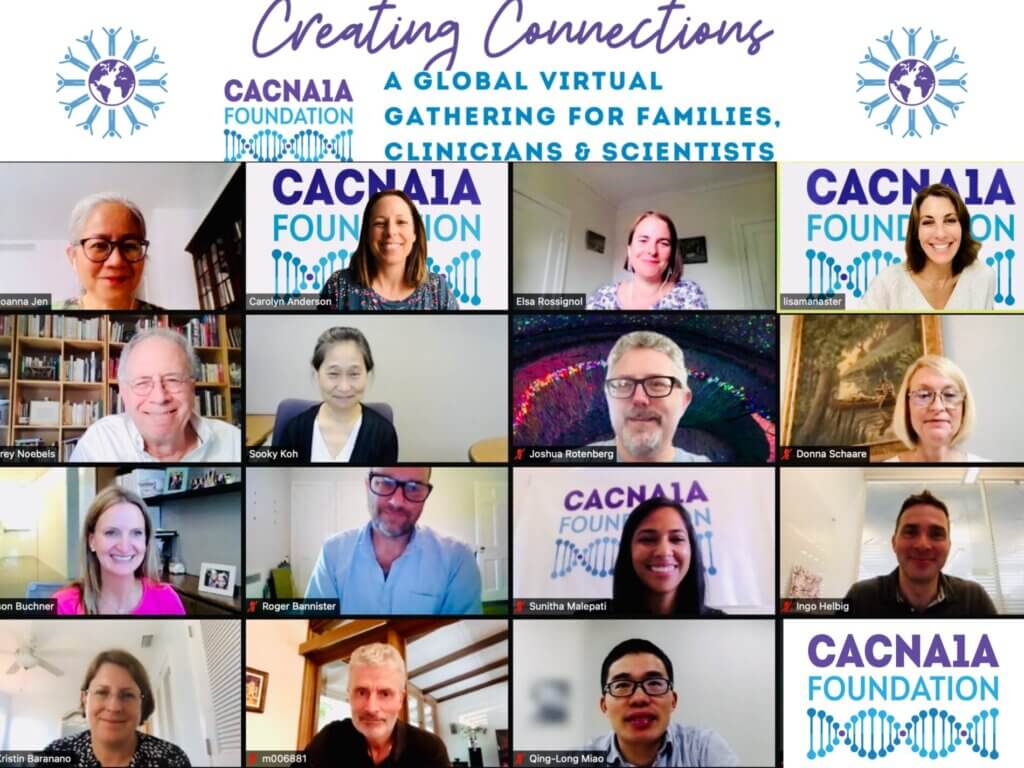
![]()
CACNA1A FOUNDATION Q&A | Lisa Manaster
The Genomenon Team sat down with CACNA1A founder Lisa Manaster, and asked her a few questions about the mission and vision of an organization doing incredible work in the rare disease space.
Tell us about what’s happening at the CACNA1A Foundation?
The CACNA1A Foundation was founded in 2020 to find specific treatment options and a cure for CACNA1A patients. It’s been a busy two years of which the highlights include funding three translational research grants, launching a natural history study, and developing a biobank that includes patient biospecimens and iPSC lines. This year we were awarded a Rare as One grant from the Chan Zuckerberg Initiative, which will be transformative for our organization. We are using the funds to build our capacity and develop a collaborative CACNA1A research network of patients, families, clinicians, and scientists that will work together to raise awareness and accelerate the understanding, diagnosis and treatment of CACNA1A-linked diseases. Currently, we are working with a team of clinicians and researchers to build a CACNA1A variant database that will aggregate multiple sources of clinical, genetic, and functional data into a single, unified resource for access by clinicians, researchers, and families. Our hope is that this database will accelerate therapeutic development by improving clinical variant interpretation, supporting clinical management, and identifying biomarkers for clinical trials.
What is CombinedBrain?
“Combined” is short for Consortium for Outcome Measures and Biomarkers for Neurodevelopmental Disorders. It is a consortium led by patient advocacy nonprofits, and its mission is to speed the path to clinical treatments for people with severe rare genetic non-verbal neurodevelopmental disorders by pooling efforts, studies, and data. CombinedBrain is a key collaborative partner of the CACNA1A Foundation.
Why is the month of March important?
March 19th is CACNA1A Awareness Day. This is our day to tell the world who we are, teach others about CACNA1A genetic variants and related disorders, and explain why funding research on this gene is so important. We chose March 19th because our organization was founded in March and our gene is located on the 19th chromosome.
What other upcoming events do you want people to know about?
We have three big events coming up. On June 11th, we will be hosting our biggest fundraiser of the year, our annual Change the Channel for CACNA1A 5K Run, Walk, Roll event. Participants will complete a 5K in their own communities to help raise awareness and funds for CACNA1A research.
![]()

![]()
In July, we are hosting our second Family Conference. This is a two-day educational event with both an in-person and virtual component. We are excited to bring patients, families, clinicians, and researchers together in person for the first time to provide an opportunity for meaningful dialog.
As part of the development of the CACNA1A collaborative research network, we are hosting our first Scientific Roundtable in September to encourage open knowledge exchange and promote cross-laboratory collaboration among researchers studying CACNA1A. Collaboration is the key to accelerating progress towards therapeutic development, and we hope this meeting will facilitate the sharing of data and ideas that will lead to the development of new therapeutics for our community.
Visit the CACNA1A Foundation website to learn more and contact us for more information.
![]()
![]()
![]()
#RAREDISEASEDAY | Follow CACNA1A Foundation on Social Media
Did you know? The Mastermind Genomic Search Engine now has Disease-Specific Curated Content for multiple rare diseases, including neurofibromatosis type 1 (NF1)? Sign up to see the enhanced data for yourself.
![]()

THURSDAY, FEBRUARY 24, 2022
Featured Rare Disease Partner Organization
BPAN Warriors
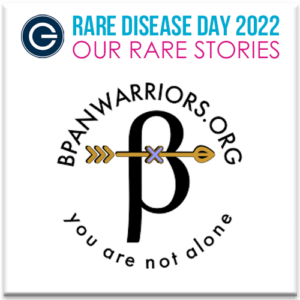 Beta-propeller protein-associated neurodegeneration (BPAN) is a devastating and life-limiting condition affecting approximately 500 children in the world. It is caused by mutations in the WDR45 gene, and can manifest a host of symptoms starting in infancy. A progressive condition, BPAN patients may experience neurodegenerative symptoms similar to those found in Parkinson disease.
Beta-propeller protein-associated neurodegeneration (BPAN) is a devastating and life-limiting condition affecting approximately 500 children in the world. It is caused by mutations in the WDR45 gene, and can manifest a host of symptoms starting in infancy. A progressive condition, BPAN patients may experience neurodegenerative symptoms similar to those found in Parkinson disease.
BPAN Warriors is a nonprofit organization dedicated to collaborating and mobilizing an international community of patients, parents/caregivers and researchers and clinicians to accelerate a cure for BPAN. As part of this effort, Genomenon partnered with BPAN Warriors to produce a curated database of the research related to 94 unique variants found within the gene linked to BPAN, WDR45—and make it freely available to any pharmaceutical company or researcher interested in using the data.
Today’s resources include a Journal of Precision Medicine article exploring this collaboration, as well as a blog by BPAN’s founder Sarah Chisholm where she discusses Genomenon’s work with BPAN Warriors in more detail. You’ll also find a link to a Children’s Hospital Genomics Roundtable, where experienced laboratory directors and clinicians share their perspectives on recent developments in the realm of clinical and research genomics—and its impact on rare disease.
Today’s resources include a Journal of Precision Medicine article exploring this collaboration, as well as a blog by BPAN’s founder Sarah Chisholm where she discusses Genomenon’s work with BPAN Warriors in more detail. You’ll also find a link to a Children’s Hospital Genomics Roundtable, where experienced laboratory directors and clinicians share their perspectives on recent developments in the realm of clinical and research genomics—and its impact on rare disease.
![]()

![]()
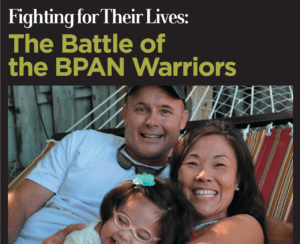
JOURNAL OF PRECISION MEDICINE ARTICLE
Fighting for Their Lives – The Battle of the BPAN Warriors
Sarah Chisholm didn’t want to start a rare disease foundation—she had to. Read Sarah’s inspiring story of perseverance when her daughter was diagnosed with beta-propeller protein-associated neurodegeneration (BPAN). This not only led to the formation of the BPAN Warriors organization, but also an amazing collaboration with Genomenon.
![]()
![]()
GENOMIC INSIGHTS BLOG
Uncovering the Genomic Variant Landscape for Rare Disease BPAN
We have been so inspired by Sarah’s story and the potential to make a difference in these parents’ quest that we have made the comprehensive genomic landscape of BPAN freely available to any pharmaceutical company or researcher interested in exploring the data. To accompany our article in The Journal of Precision Medicine, this blog details the aftermath of Genomenon reaching out to see if we could assist in her cause.
![]()

![]()
#RAREDISEASEDAY | Follow BPAN Warriors on Social Media
 | |||
![]()
RARE DISEASE WEBINAR | Children’s Hospital Genomics Roundtable
Streamlining Genetic Diagnosis and Treatment Plans for Rare Disorder and Pediatric Cancer Predisposition
In this roundtable discussion, experienced laboratory directors and clinicians leading the charge in pediatric genomics research share their perspectives on recent developments and current practices within clinical genomics. Additionally, they describe how the Mastermind Genomic Search Engine is advancing genomic discovery for rare diseases and cancer in children.
![]()
Did you know? The Mastermind Genomic Search Engine now has Disease-Specific Curated Content for hypophosphatasia? Sign up to see the enhanced data for yourself.
![]()

![]()
![]()
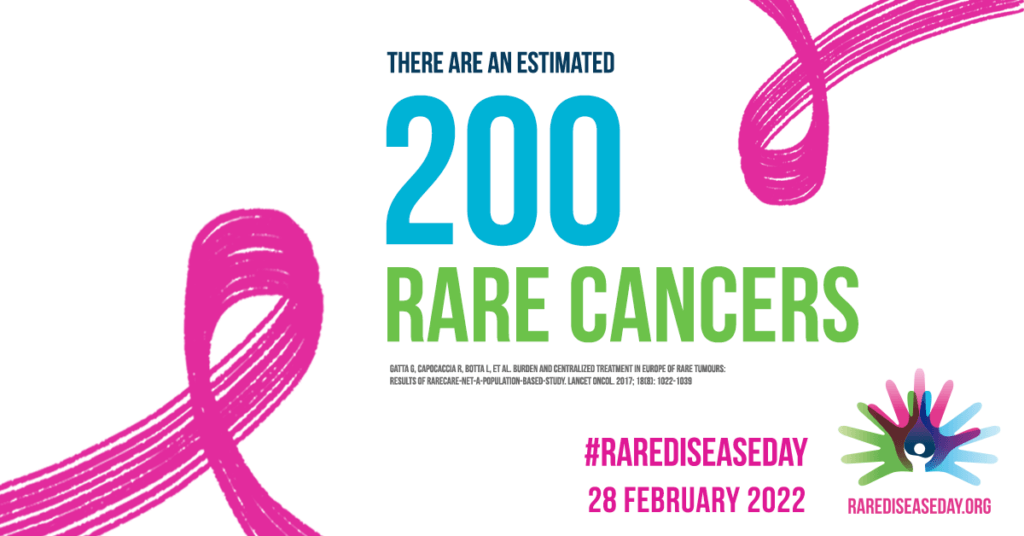
![]()
![]()
WEDNESDAY, FEBRUARY 23, 2022
Rare Disease Feature | ENPP1 Deficiency
Streamlining Medical Evidence Curation for Rare Disease Diagnosis and Treatment
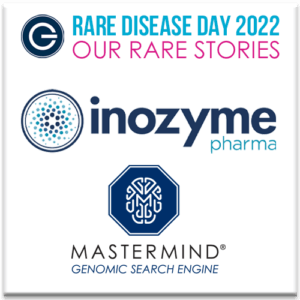 ENPP1 Deficiency is a progressive, diverse condition with serious manifestations occurring throughout life—in fact, 50% of diagnosed babies do not live past 6 months. Children and adults with ENPP1 Deficiency typically experience rickets and osteomalacia (softened bones) and can exhibit a range of signs and symptoms such as hearing loss, joint and bone pain, arterial calcification, cardiac dysfunction, and neurological complications. There are currently no approved treatments for this devastating disease.
ENPP1 Deficiency is a progressive, diverse condition with serious manifestations occurring throughout life—in fact, 50% of diagnosed babies do not live past 6 months. Children and adults with ENPP1 Deficiency typically experience rickets and osteomalacia (softened bones) and can exhibit a range of signs and symptoms such as hearing loss, joint and bone pain, arterial calcification, cardiac dysfunction, and neurological complications. There are currently no approved treatments for this devastating disease.
For today’s feature, we shine a light on ENPP1 Deficiency, and the life-changing work in which we are humbled to take part. Specifically, we are collaborating with Inozyme Pharma to help inform and accelerate patient diagnosis by producing the world’s most comprehensive variant landscape for ENPP1 Deficiency. This AI-driven and expertly curated genetic dataset, along with information on available clinical trials and therapies, has been made readily available to doctors, researchers, and clinicians.
Below you’ll find more resources about this work, including a webinar co-hosted by our CSO Mark Kiel, and Gus Khursigara, VP of Medical Affairs and Clinical Strategy at Inozyme. You’ll also have a chance to see curated content for ENPP1 in Mastermind, as well as read an article in Authority Magazine, where Inozyme’s Chief Operating Officer Henric Bjarke discusses the impact this collaboration is having in the rare disease space. Finally, read an incredible case study story of how Mastermind helped a leading pharmaceutical company enhance their rare disease efforts.
![]()
![]()
Health Tech Article| Henric Bjarke
How Inozyme Pharma’s Technology Can Make An Important Impact On Our Overall Wellness

“Additionally, our partner Genomenon, an AI-driven genomics company, has assembled the world’s most comprehensive knowledge base of ENPP1 Deficiency disease genetics for use in clinical practice. Using this AI-driven and expertly curated genetic dataset, along with information on available clinical trials of investigational therapies, clinicians can more easily search and review the pertinent literature and make more timely and more accurate diagnoses. And when a treatment becomes available, the database should help physicians steer patients to that therapy and, ideally, lead to better outcomes.” – Henric Bjarke, Senior Vice President and Chief Operating Officer, Inozyme Pharma
![]()
#DYK that 72% of #RareDiseases are genetic? To help improve the detection and understanding of #ENPP1 Deficiency, we offer no-cost genetic testing. Check out the eligibility criteria here: https://t.co/7ZWjsSbpXT #RareDiseaseDay pic.twitter.com/0WJvonSrrm
— Inozyme Pharma (@inozyme) February 16, 2022
#RAREDISEASEDAY | Follow Inozyme Pharma on Social Media
 | ||
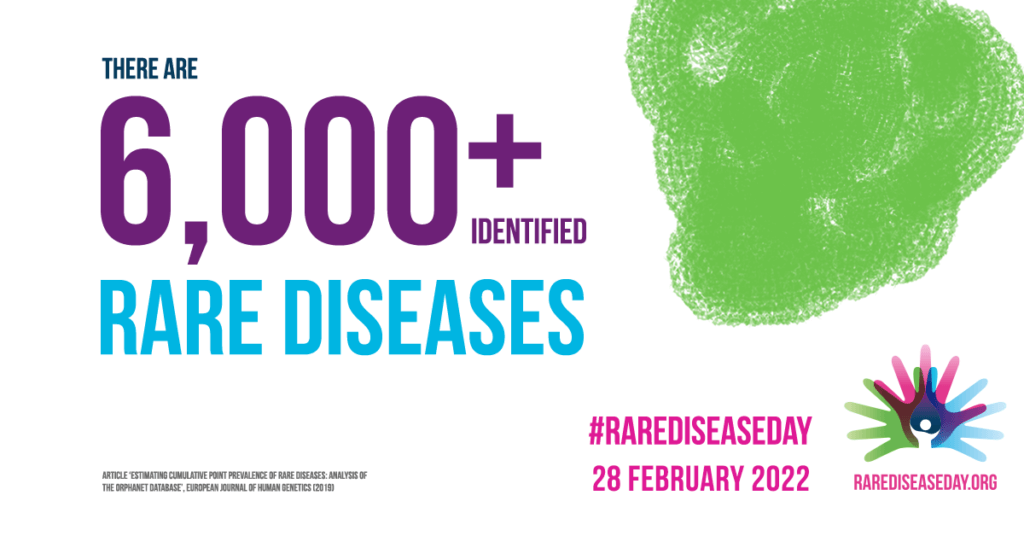
MASTERMIND CASE STUDY | RARE DISEASE PHARMA
The Genomic Landscape of Rare Obesity Disorders
Read the Mastermind Case Study where a leading rare disease pharma company leveraged AI-driven insights from Genomenon to target their clinical trials.

Did you know? The Mastermind Genomic Search Engine now has Disease-Specific Curated Content for multiple rare diseases such as BPAN? Sign up to see the enhanced data for WDR45 for yourself.
![]()

![]()
![]()
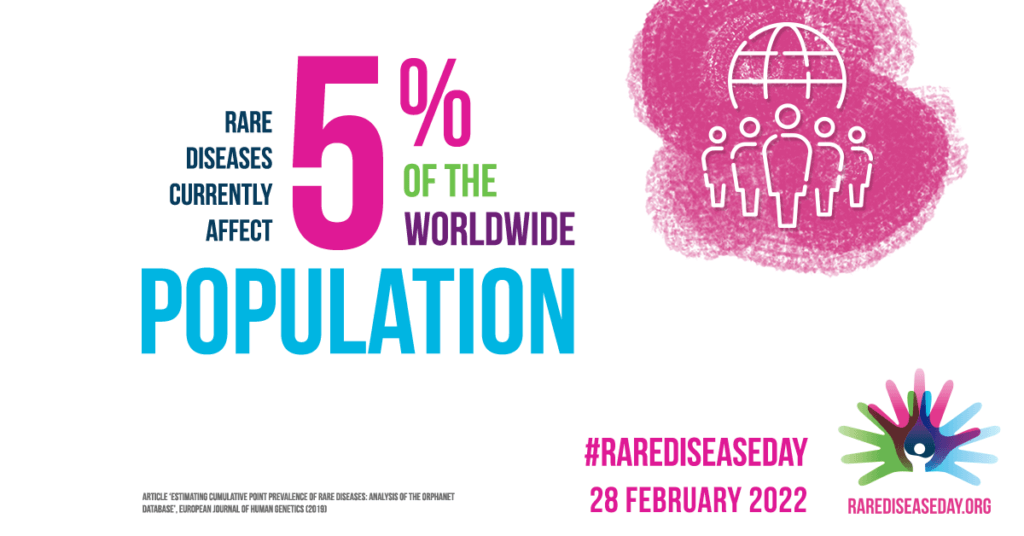
![]()
![]()
TUESDAY, FEBRUARY 22, 2022
Featured Rare Disease Partner Organization
Don’t Forget Morgan
Today’s resources include a guest blog authored by Kaci Kegler, a BPAN mom and advisor for Don’t Forget Morgan, as well as a press release with more details about this exciting collaboration. You’ll also find an incredible story about how Genomenon’s Mastermind® Genomic Search Engine helped confirm a rare disease diagnosis at the Rare Genomics Institute.
Don’t Forget Morgan is a nonprofit organization consisting of volunteer professionals from rare disease research, drug development, patient advocacy, and clinical care. Together, these individuals not only raise awareness and advocate for BPAN research—they also provide a shared sense of community for families with affected children. To expedite the global BPAN research process, Genomenon has partnered with Don’t Forget Morgan to generate a curated Genomic Landscape of 94 unique genetic mutations found within the WDR45 gene.
![]()
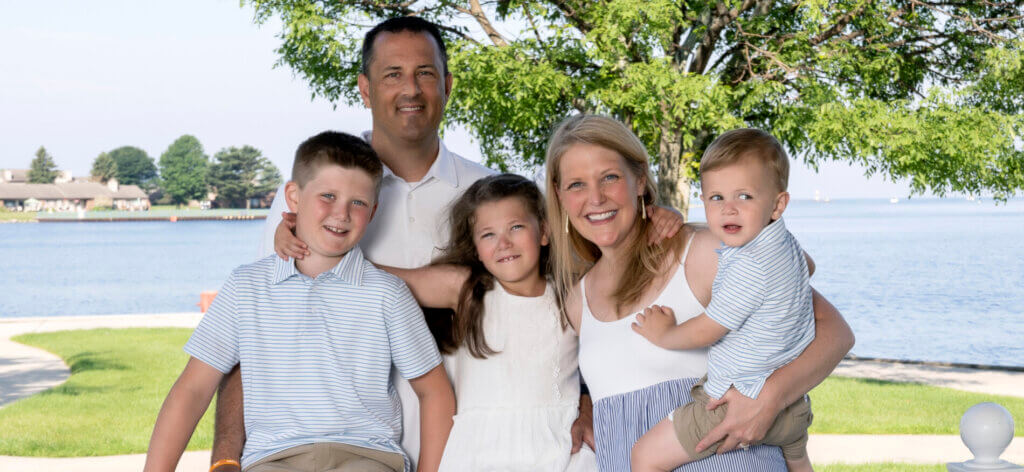
![]()
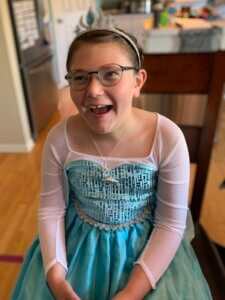 Beta-propeller protein-associated neurodegeneration (BPAN) is a devastating, life-limiting condition affecting approximately 500 children in the world. Caused by mutations in the WDR45 gene, BPAN can cause a host of symptoms starting in infancy, including seizures and developmental delays. Over time, patients will lose cognitive abilities and muscle function, and experience neurodegenerative symptoms similar to those found in Parkinson disease.
Beta-propeller protein-associated neurodegeneration (BPAN) is a devastating, life-limiting condition affecting approximately 500 children in the world. Caused by mutations in the WDR45 gene, BPAN can cause a host of symptoms starting in infancy, including seizures and developmental delays. Over time, patients will lose cognitive abilities and muscle function, and experience neurodegenerative symptoms similar to those found in Parkinson disease.
In this guest blog, we are honored to introduce Kaci Kegler, a BPAN mom and advisor for Don’t Forget Morgan. Kaci will share the difficult reality of her daughter’s BPAN diagnosis, and how this experience has fueled her passion to support and advocate for the growing patient community. Also, she will describe how the recent collaboration between Don’t Forget Morgan and Genomenon is transforming the lives of people affected by not only BPAN, but all rare diseases and conditions.
![]()
![]()
PRESS RELEASE | Genomenon Partners with Don’t Forget Morgan to Provide New Hope for Rare Disease
Read today’s official media announcement about Genomenon’s partnership with Don’t Forget Morgan. This special collaboration will provide resources to assist researchers and encourage pharmaceutical companies to invest in finding effective treatments for BPAN, as well as empower patient care teams with actionable genetic information.
#RAREDISEASEDAY | Follow Don’t Forget Morgan on Social Media

A MASTERMIND STORY | Rare Genomics Institute
Single Research Paper Found in Mastermind Leads to Diagnosis
The Rare Genomics Institute RGI used the Mastermind Genomic Search Engine to find a single research report in the scientific literature that matched a previously undiagnosed patient’s DNA data and led to a diagnosis. Using technology that wasn’t available just a few years ago, Genomenon puts the research for almost 15 million genomic variants₁ at the scientist’s fingertips to make sure that no stone is left unturned in providing a comprehensive diagnosis.

“Sometimes there is only one research paper that can connect a patient’s DNA with a diagnosis. Searching through millions of research papers to find a patient’s genetic mutation can be like trying to find a needle in a haystack. With advanced AI techniques used by Genomenon, the needle can pop right into view.” – Dr. Lipika Ray, Rare Genomics Institute
![]()
Did you know that there are 6000+ identified rare diseases? Rare disease patients fight their disease every day. The mystery of their disease can go for many years without an official diagnosis, or coverage for needed tests and services. – @rarediseaseday pic.twitter.com/XAEjFbZ9PI
— Rare Genomics (@RareGenomics) February 6, 2022
![]()
#RAREDISEASEDAY | Follow the Rare Genomics Institute on on Social Media
 |  |
||
![]()
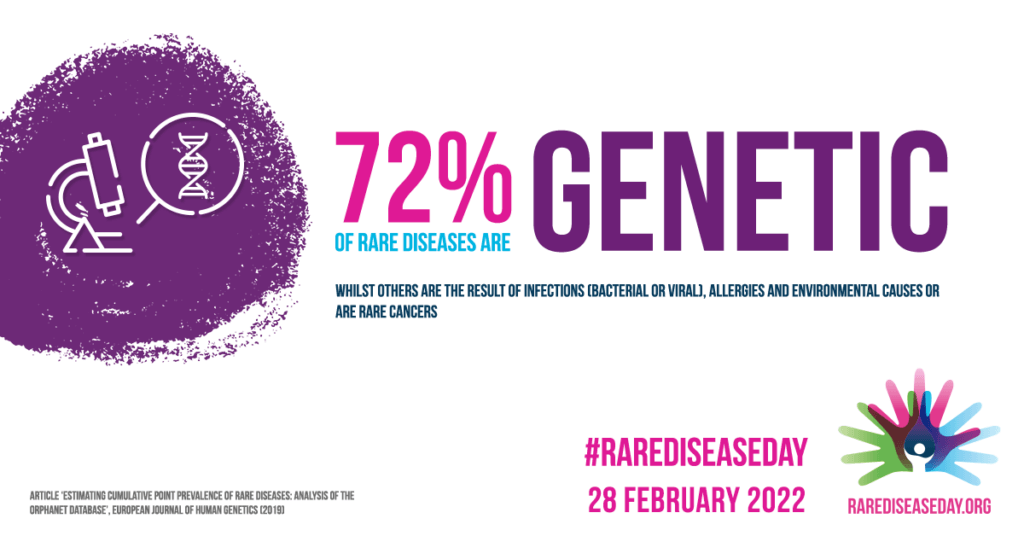
![]()

![]()
MONDAY, FEBRUARY 21, 2022
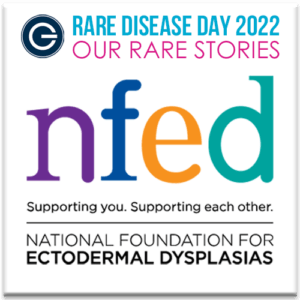
Featured Rare Disease Partner Organization
National Foundation for Ectodermal Dysplasias
Ectodermal dysplasias (ED) are a group of disorders in which two or more of the ectodermally derived structures—such as skin, sweat glands, hair, nails, teeth and mucous membranes—develop abnormally. It is estimated that 3.5 of every 10,000 children born are affected by ED, with more than two million affected individuals worldwide. Diagnosed with ED in adolescence, Genomenon CSO Dr. Mark Kiel has experienced the diagnostic odyssey firsthand. This not only inspired his career in clinical genomics—it also fueled a desire to advocate for others affected by rare disease.
The National Foundation for Ectodermal Dysplasias (NFED) is dedicated to empowering and connecting those touched by ED through education, support, and research. Genomenon has partnered with NFED to forward these efforts by making the genomic landscape for ED open for all—this means more research and more support for families.
The below resources tell the story of our progress with ED, including an article published in The Journal of Precision Medicine and a partner webinar with varvis® where we explore rare disease challenges. Finally, you’ll have the chance to learn more about NFED and the amazing support they offer to rare disease patients.
“Offering such a database to NFED is a very personal piece of a wider goal that all of us at Genomenon share—to make a lasting impact on rare disease.” – Dr. Mark Kiel, Founder & CSO. Genomenon
“Because ectodermal dysplasias are such rare, genetic disorders, many individuals don’t know where to turn to understand their diagnosis. The NFED was founded to be that place where affected individuals and their families can go to get accurate information and find their community. We offer information and resources in one location and our door is always open to new members.”
– Mary Fete, MSN, R.N., CCM
Executive Director, National Foundation for Ectodermal Dysplasias

![]()
JOURNAL OF PRECISION MEDICINE ARTICLE
The Journey Toward a Cure with Rare Disease Foundation NFED
This article describes the essential collaboration—and personal connection—between Genomenon and the NFED. Read about our quest to have every rare disease patient accurately diagnosed and properly treated.

February is Ectodermal Dysplasias Awareness Month. Please help us spread the word about these rare conditions and join us in raising up this incredible community through awareness, advocacy and action! #EDAM #ectodermaldysplasiasawarenessmonth https://t.co/8Thl4hp3G5 pic.twitter.com/38G1FtryFt
— National Foundation for Ectodermal Dysplasias (@NFED_ORG) February 1, 2022
Overview of the NFED:
The National Foundation for Ectodermal Dysplasias (NFED) empowers and connects those touched by ectodermal dysplasias through education, support and research.
Ectodermal dysplasias are a group of inherited disorders that involve defects in the hair, nails, sweat glands and teeth.
This year, the NFED is celebrating 40 years of supporting families affected by ectodermal dysplasias, many of whom don’t know where else to turn for information about their diagnosis and treatment options. The lack of medical literature available in the early 80s on these rare genetic syndromes was one of the driving factors behind the organization’s founding. The NFED filled a gap and provided a community for anyone affected by ectodermal dysplasias.
At the time of the NFED’s founding, the medical literature cited only a half dozen affected individuals in the United States. Today, there are more than two million individuals worldwide who are living with ectodermal dysplasias. The NFED currently serves over 9,200 affected individuals and families in 118 countries.
#RAREDISEASEDAY | Follow NFED on Social Media
 |  |
||
EXPERT WEBINAR | The Challenge of Variant Interpretation
Leveraging Genetic and Clinical Evidence to Improve the Diagnosis of Rare Diseases
In this webinar, genomics experts from Limbus Medical Technologies, MGZ Munich, and Genomenon share their perspectives on what is necessary to successfully accept challenges in clinical routine and what tools are available and needed to accelerate and improve the diagnostic process.
![]()
You can learn more about our partnership with trusted Mastermind Integration Partner varvisⓇ here.
Stay up to date with Limbus Medical Technologies and visit their website to learn more about varvisⓇ.
#RAREDISEASEDAY | Follow varvisⓇ on Social Media
 | |

Close to 300 million patients worldwide have diagnoses related to 7,000 unique rare diseases, more than 70% of which have an underlying genetic cause. Accurate and timely diagnoses are necessary to address the costly, unmet needs of rare disease sufferers—however, the complicated biology of rare diseases creates a dire need for better information. Oftentimes, patients and their families are left with few options.
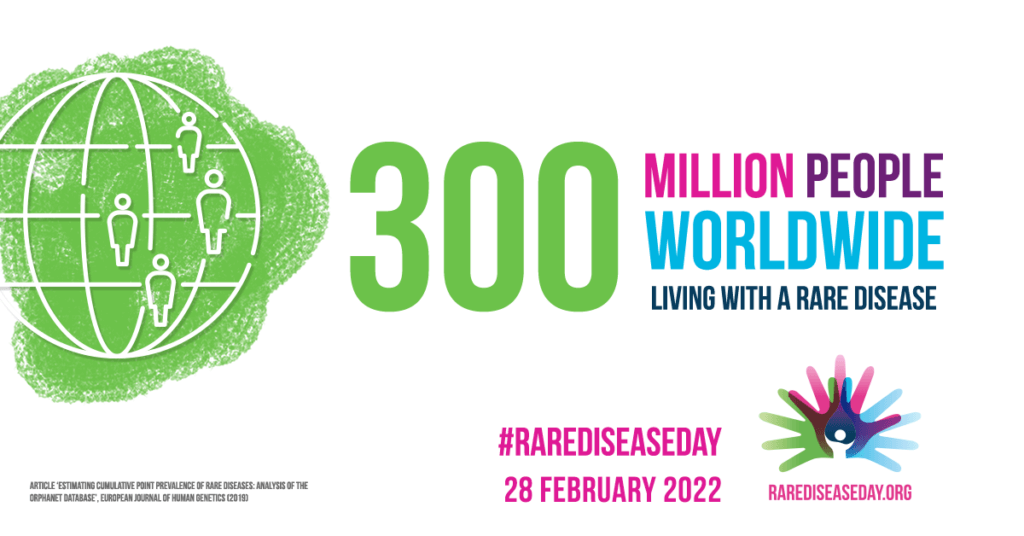
Follow our journey as it develops each day by sharing this page with your network using the below links to help raise awareness.
#RAREDISEASEDAY | Follow Our Rare Stories on Social Media
 |  |
||



